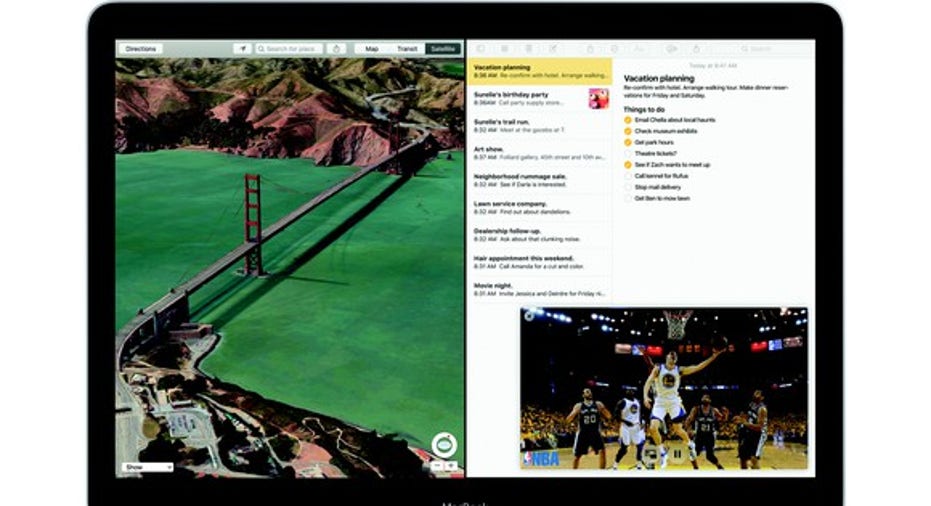Is This Trend Over for Apple?

Image source: Apple.
Over the last 10 years, Apple has consistently increased its share of the PC market with its line of Macs. In fact, Apple has gained market share in 39 of the last 40 quarters.
That trend may be coming to an end, however, as IDC estimates the global PC market didn't fall as much as originally expected last quarter, just 4.5%. The research firm expects Apple to report an 8.3% decline in Mac shipments when it provides its earnings results later this month.
Mac sales accounted for 9.4% of Apple's total sales through the first six months of fiscal 2016. The product is of increasing importance in light of weakness in iPad sales and a hangover from strong iPhone 6 sales.
Should investors worry about Apple's ability to grow its share of the PC market?
A look at what's causing the sales slowdown
In IDC's report, the research company provides an explanation for Apple's outsized decline in shipments: "Apple continues to face an increasingly competitive market as it awaits a refresh of its PC lineup."
Apple's Macbook lineup is long overdue for a refresh. The company released the new Macbook last spring, but hasn't updated the Macbook Air, Macbook Pro, iMac, or Mac Pro lines in some time. They all still use older generations of Intel's chips, and the portables need a design refresh to support new ports like Thunderbolt 3 (USB-C) and better displays on the Air.
Apple is expected to unveil refreshes to its Mac lineup in the fall when it usually releases new iPhones and iPads. That means that Apple's Mac sales could languish for another quarter before getting a bump from the new releases in the last three months of 2016.
Adding to that is the economic uncertainty hanging over Europe after the Brexit vote last month. That could cause a bigger decline in PC sales, particularly the premium-priced consumer-facing Macs Apple produces. Additionally, Apple is facing slowing growth in the Chinese market that drove its sales last year.
Is a product refresh really all that's needed?
Apple's PC market share growth was fueled by the adoption of its other devices like the iPhone and iPad. But Apple is now starting to experience a decline in iPhone sales, and iPad sales have been declining for some time already. That trend would indicate that Apple's Mac sales may have already peaked.
Even with slight growth in the U.S. PC market last quarter, IDC says Apple failed to grow its Mac sales in the country year over year. Apple took just 11.2% of the market in the United States. By comparison, its share of the smartphone market in the country is close to 44%. That indicates that even Apple's well-established user base of over 1 billion active devices isn't enough to spur sales of the Mac.
That might make investors question whether a product refresh is all that's needed to spur sales of the Mac. However consider the factors behind the slowing sales of Apple's other devices: It had a blockbuster product with the iPhone 6 (iPhone 6s sales are still outpacing iPhone 5s sales), and the product lifecycle is getting longer.
While the latter factor may apply to PCs, the market has largely adjusted to the introduction of smartphones and tablets. Apple's Macbook release was popular, boosting sales of Macs for a few quarters, though not to the degree that the iPhone 6 increased iPhone sales (and on a much larger scale, no less). There's no explanation for the decline in Mac market share other than a lack of refresh.
So, what's taking so long?
Apple may have been too aggressive in its plans for a Mac refresh. Apple has historically held off on product ideas because it was missing some technology. This can be bad for short-term results, but ultimately benefits Apple in the long term as it leapfrogs the competition.
Still, Apple's hesitation to push a smaller update to Macs with new processors and designs has caused it to fall well behind the competition, and certainly seems like an error in judgment. Nonetheless, Apple should be able to rectify the problem just by updating its product line, as there's no other indication that Apple is suffering a long-term decline in its brand.
The article Is This Trend Over for Apple? originally appeared on Fool.com.
Adam Levy owns shares of Apple. The Motley Fool owns shares of and recommends Apple. The Motley Fool has the following options: long January 2018 $90 calls on Apple and short January 2018 $95 calls on Apple. The Motley Fool recommends Intel. Try any of our Foolish newsletter services free for 30 days. We Fools may not all hold the same opinions, but we all believe that considering a diverse range of insights makes us better investors. The Motley Fool has a disclosure policy.
Copyright 1995 - 2016 The Motley Fool, LLC. All rights reserved. The Motley Fool has a disclosure policy.



















